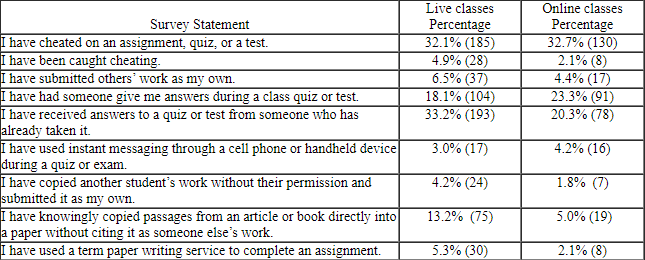Candidates Cheating: The 2024 Complete Guide to Online Test Cheating Prevention, Proctoring and Protection

Cheating in any form of test, exam or assessment has always been a problem, and always will be. That is just the reality. Online tests are no different. The remote, online, digital nature of these tests pose both an additional challenge in cheating prevention, but also many opportunities to better monitor, measure and deal with the cheating, relative to analog in-person tests.
This guide provides a comprehensive discussion of the current state of cheating in online testing in 2024. The guide covers:
- the current state of cheating
- understanding why candidates cheat
- the types of cheating that are possible, including ChatGPT cheating
- typical defences against different cheating options
- available proctoring options
- introduction to Alooba’s Advanced Cheating Protection System (AACPS)
- and lots more!
Feel free to reach out to Alooba to learn more about our Advanced Cheating Protection System (AACPS).
Does Alooba offer a standalone proctoring tool?
Alooba does not currently licence its proctoring and cheating protection technology. Alooba’s Advanced Cheating Protection System (AACPS) is a core part of the Alooba technology stack and is embedded into the core products like Alooba Assess, Alooba Growth and Alooba Interview. You can leverage AACPS when you sign up to Alooba.
What are the top trends in online test cheating and prevention?
The last couple of years have been an interesting time for online testing in general, both in the hiring markets and education sector.
The Covid pandemic from 2020 to 2022 pushed the world’s populations into its homes. But life had to go on, as they say, and so work shifted from the office to the home, and so did education.
This then meant that candidates were being evaluated largely online in their homes, and so too students.
The other significant development has been to maturation of AI technology, in particular Large Language Models like ChatGPT.
ChatGPT and other products like Bard have provided candidates with a new potential avenue to cheating, and cheating prevention systems have had to develop further capabilities to combat these tools.
What innovations have there been in online cheating prevention?
There have been some recent innovations in online cheating prevention, driven largely by the explosion in popularity of remote recruitment and education, and the maturation of AI models like ChatGPT. These innovations include being able to detect AI-generated content, real-time AI proctoring and other advanced techniques.
What are the consequences of cheating?
Cheating when left unmonitored & unchallenged, poses a range of issues in any evaluation system, including:
- Honest candidates get punished for being honest and are in effect encouraged to be dishonest in the future, leading to a vicious cycle.
- The test result becomes an inaccurate representation of the candidate’s true knowledge in that area.
- With relative rankings in place, the best honest candidate may no longer score well enough to succeed to the next stage; you’ve missed out ‘the one’!
- Candidates lose faith in the evaluation process and in the employer running the process, damaging the employer brand.
- Wasted time interviewing candidates who don’t have the right skills.
Ultimately, these will result in the wrong person being hired into the role. This may seem bad for a Software Engineering role where the cost of a bad hire can be 2.5x the salary, but imagine a pilot or doctor - then the impact could be catastrophic.
For the cheater themselves, there are also potentially dire consequences of cheating, especially if they are caught. As we discuss below, candidates face all sorts of issues, including potential litigation and criminal prosecution.
If Googling and ChatGPT are part of everyday work, why are they considered cheating?
This is a great question, and perhaps this expectation will change through time. Currently the majority of employers we speak with would consider both of these practices as cheating. As a result, Alooba’s technology actively monitors and prevents AI cheating and using external resources like Googling.
Is cheating only part of online tests?
Cheating can - and does - take place during in-person and online exams.
For example, a recent study at Marshall University investigated whether students were more or less likely to cheat in online exams vs face-to-face exams. They found that the prevalence of cheating was roughly the same - around 32% admitted to cheating either online or in-person.

Interestingly, a far smaller percent admitted to directly copying/plagiarising a passage online vs in-person. This gives us a key insight into candidates’ thought processes - candidates are dramatically less likely to cheat when they understand that they can be easily tracked, monitored and punished.
Detecting plagiarised content in online tests are straightforward. Doing it for an in-person paper exam in person is much more difficult and costly, and so candidates realise the analog nature of it provides them with an opportunity to avoid detection.
Do candidates cheat with take-home tests?
And so for in-person exams and online exams the rate of cheating seems the same, but what about for take-home tests done without any proctoring? Yes, candidates also cheat in these take-home tests that they do in their own time.
Unfortunately, studies indicate that unproctored tests are 4x as likely to involve cheating. If cheating prevention is part of the overall hiring strategy, we’d strongly recommend avoiding your own take-home tests, because it is not possible to monitor what candidates are doing during these tests.
This is why it’s so important to ensure your candidates are assessed in a fair, robust and valid way. Check out Alooba vs creating your own tests for a comprehensive comparison of the two options, including the cost difference, speed of execution and cheating prevention options.
Do candidates lie on their CVs?
Just like with tests, candidates can and do lie on their CVs. According to a comprehensive survey from the reference checking product Checkster, approximately 78% of candidates lie on their CV. The lies are also not insignificant ones - they’re highly material.
The most common things that are lied about include:
- 60%: having a mastery of skills
- 50%: working at a company longer
- 49%: having a higher university score
- 41%: holding a more senior position
- 39%: attending a more prestigious university
- 33%: claiming false achievements
This is one of the many reasons why CV screening doesn’t work. Instead of CVs, learn how to screen effectively & objectively with a thorough Alooba skills screening test.
Can cheating be completely eliminated?
No. Cheating and fraud, in any situation, will never be eliminated entirely. Even in the most invasive and high cost forms of monitoring for tests like in-person invigilation, cheating is still possible.
However, there is a very big difference between no cheating protection measures and a comprehensive suite of measures that minimise the chance of cheating and then detect it when it has occurred. Cheating can be drastically reduced and managed when done right. We discuss a range of methods which collectively help to reduce cheating significantly.
What can companies do in the fight against candidate cheating?
It’s imperative that companies set-up their hiring process to ensure that they hire the best candidate as often as possible. Anything that prevents that from taking place should be tackled and ideally eliminated.
There are various things that prevent companies from hiring the best person, including bias, discrimination, cheating, ineffective selection techniques and not measuring the right things.
By reducing the likelihood of cheating using robust cheating prevention, companies can improve their chances of hiring the best person and avoid a dreaded bad hire. Most companies are not in a position to develop their own candidate cheating prevention technology, and so realistically will need to engage in technology vendors to leverage their cheating prevention suite.
What are the different types of cheating that exist and how are they prevented?
There are a range of different ways that cheating can take place in a test, depending on the type of test that’s taking place.
Broadly speaking, the categories of cheating are:
- Plagiarism: this is essentially where the test taker copies someone else’s existing answers to the problem, without citing them at the original source.
- Collaboration: this is when the test taker assigned the test is not the one who actually completes the test, or multiple test takers collaborate together.
- Unfair advantage: this is a catch all situation where the test taker is able to extract some kind of other advantage, above and beyond what the other test takers face.
Unpacking these categories, there are numerous different ways that a candidate could potentially cheat. We outline a few ways that these types of cheating are normally prevented:
- A candidate copies an existing solution to the answer → make sure you limit access to the answer content and rotate questions.
- A candidate gets to take the same test multiple times → make sure you track who has taken the test fully and prevent unnecessary retakes.
- A candidate gets more time to complete the test than other candidates → make sure tests are timed properly.
- A candidate gets some help from Google to complete the assessment → make sure candidates can only take tests in a single test window and prevent exits.
- A candidate gets ChatGPT, Bard or another AI tool to complete the assessment → make sure candidates can only take tests in a single test window and prevent exits & auto detect AI generated content.
- A candidate gets their friend to complete the assessment → validate who the candidate is with 2-factor authentication and video proctoring.
- Getting a second chance/retake → make sure candidates have legitimate reasons and evidence for getting a second chance.
What are some ways to reduce online cheating?
It’s essential to have a wide variety of methods to a) prevent cheating in the first place b) identify & report it if it does happen.
You’ll want to use the full arsenal of options at your disposal, including technological solutions, data & AI solutions, psychological solutions and in extreme cases, even potential legal solutions.
A wide variety of measures need to be used in conjunction with each other. They’ll each play their role in an active defence against cheating from candidates.
Keen to learn more about Alooba’s Advanced Cheating Protection System? We don’t publish details of this technology online in order to retain its integrity. Feel free to chat with us to learn more about Alooba’s approach.
What types of proctoring exist?
Proctoring is one tool in your anti-cheating toolkit. When it comes to proctoring, you’ve got a few options:
- Live human proctoring online: a live person monitors the candidate as they share access to their webcam & screen.
- Live human proctoring in-person: an invigilator monitors candidates in a physical examination room.
- Automated proctoring: an artificial intelligence system monitors candidates online.
- Asynchronous human proctoring: a person reviews the candidate’s webcam, screen recording and other data, after the fact.
In most hiring contexts (other large scale graduate assessment centres), live human proctoring in-person is impractical as it’s a massive barrier to completing hiring and prohibitively expensive.
Live human online proctoring does fly in some markets and is considered acceptable and normal, but it is far too invasive to be used in western countries like Canada, UK, USA and Australia.
The pushback from candidates would be so high that it would cause a catastrophic drop-off in the completion rate, and significant blowback against the employer brand online. This was clearly seen at the start of the Covid pandemic when student exams were moved online, and there was an uproar at the techniques used to monitor students.
Some of the live proctoring tools require candidates to allow control of their computer to a stranger on the other side of the world - a significant and regrettable security risk - and also require candidates to turn their webcam around and show a complete video of the room that they’re in. Not only does this approach pose a security and branding risk, but also impinges on the privacy of the candidate.
Automated proctoring and asynchronous human proctoring are far more commonly used these days, and present the best balance between minimising cheating and maintaining a pleasant candidate experience.
What is Alooba’s approach to online cheating?
Alooba’s approach is to employ a comprehensive combination of preventative and reactive measures to combat the wide range of different types of candidate malpractice and cheating. All identified cheating is presented to the customer against the candidate’s results.

Alooba’s Advanced Cheating Protection System is a proprietary system developed over 5 years to help minimise and prevent cheating in online testing, and this forms the backbone of the core Alooba products Alooba Assess, Alooba Junior & Alooba Growth.
To date, Alooba has collected more than 12M test events for more than 100k candidate tests. With Alooba being founded in 2019, years before ChatGPT rose to prominence, Alooba’s uniquely positioned to understand what a normal non-AI exam pattern looks like. These insights play a crucial role in us defending our customers against AI-based cheating, which is a core part of the AACPS defence.
Alooba does not publish details of its system publically in order to retain the integrity of the system. Feel free to contact your Alooba account manager for more information.
Why do candidates cheat on tests?
The motivation to cheat seems pretty obvious - it’s a shortcut to achieve what the candidate wants; like a good grade, an interview or a job.
However, various extensive studies have further investigated why exactly candidates choose to cheat. For example the paper Cheating on exams: Investigating Reasons, Attitudes, and the Role of Demographic Variables published in 2021 found these were the top reported reasons why students decided to cheat in their tests:
- Not being prepared (51%)
- The irrelevance of the content (47%)
- To get a better score (42%)
- The difficulty of the test (38%)
- Not having enough time to study (37%)
While these might not translate perfectly to cheating for employment tests, they do provide a good insight into the motivations, which then helps to understand which preventative measures will work well, and which won’t.
Why do candidates not cheat?
Perhaps a more interesting question is why do candidates not cheat, and this study found that the most common reasons cited by students were:
- because it affects the rights and scores of other candidates
- because it may bring shame & dishonour
- because of the fear of cheating
- because it’s not possible to cheat
- because it is morally and socially unacceptable
Again, this might not translate perfectly to hiring assessments, but understanding these motivations help to understand what employers should and should not do to prevent cheating.
I’m a candidate and I just want a job - should I cheat?
We would not recommend this for several reasons, despite how tempting it may be.
First, in the case of Alooba tests for example, Alooba is a skills assessment platform, where companies evaluate candidates in required skills for the role. If you take an Alooba test and perform poorly, that’s a reasonable indication that you don’t currently have the skills needed for the role.
The end of test feedback will give you some great insights into your current strengths and weaknesses. Armed with this insight, you then have all the opportunities to go and then upskill in these areas, ready to apply again next time. Remember, the result is only a reflection of your current skill - so it’s up to you to change that.
Second, Alooba detects, flags and reports cheating to customers. Alooba does not report cheating to the candidate in question, so even if a candidate thinks that they’ve gotten away with it, they have not. With an extensive array of checks and balances, it’s very unlikely that a candidate can cheat undetected. With some employers choosing to retain blocked lists of candidates that have cheated, we’d strongly encourage you to not take that risk - it’s simply not worth it!
Third, it’s just the wrong thing to do. We’d encourage you to think about your fellow candidates who are doing the right thing, and how unfair it would be if you were able to get ahead of them when they were playing by the rules. Remember the old saying: “Cheaters never prosper”.
Fourth, cheating is a slippery slope. Psychological studies have shown that dishonest behaviour actually alters someone’s sense of right and wrong. So, after cheating once, you’re likely to view this as an acceptable thing to do.
Fifth, depending on the laws relating to where you live and where the role is, you may find yourself in legal hotwaters. For example in Australia, lying on your CV is considered fraud. In the UK, a leader of the National Health Service recently received a 6 month suspended prison sentence for lying on their job application. While it is of course very rare that candidate fraud results in a prosecution, you do potentially open yourself up to both criminal and civil actions.




